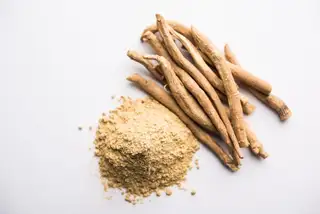
Top 4 Best Herbs for Gut Health and Inflammation
In the pursuit of optimal health, the significance of a well-functioning gut and the management of inflammation cannot be overstated. Our gut plays a crucial role in digestion, nutrient absorption, immune function, and overall well-being. Inflammation, on the other hand, is a natural response by the body but can become chronic and lead to various health issues when not properly regulated. Fortunately, nature provides us with an array of herbs that offer potential benefits for both gut health and inflammation. In this article, we will explore the top 4 best herbs that have shown promise in supporting these vital aspects of our health.
1. Turmeric
Turmeric, with its active compound curcumin, has gained significant attention in recent years for its anti-inflammatory and gut-health-promoting properties. Curcumin has been shown to inhibit inflammatory pathways in the body, reducing the production of inflammatory molecules. This makes it particularly beneficial for conditions associated with chronic inflammation, such as rheumatoid arthritis, inflammatory bowel disease, and even certain cardiovascular diseases.
In terms of gut health, turmeric can help maintain the integrity of the intestinal barrier. The intestinal barrier acts as a protective shield, preventing harmful substances from entering the bloodstream. When this barrier is compromised, it can lead to leaky gut syndrome, which is associated with various digestive disorders and systemic inflammation. Turmeric's antioxidant and anti-inflammatory effects contribute to strengthening this barrier and promoting a healthy gut environment.
For example, studies have shown that curcumin supplementation can improve symptoms of ulcerative colitis, a type of inflammatory bowel disease, by reducing inflammation and promoting healing of the intestinal lining. Additionally, its ability to modulate the gut microbiota, the community of microorganisms in the gut, may also play a role in maintaining gut balance and overall health.
2. Ginger
Ginger is another powerful herb known for its anti-inflammatory and digestive benefits. It contains compounds such as gingerols and shogaols that have been demonstrated to have potent anti-inflammatory effects. These compounds can help reduce inflammation throughout the body, including in the gastrointestinal tract.
In the context of gut health, ginger is well-known for its ability to alleviate nausea, vomiting, and indigestion. It can stimulate the production of digestive enzymes, improving the breakdown and absorption of nutrients. Moreover, ginger has shown promise in reducing intestinal spasms and inflammation, which can be beneficial for conditions like irritable bowel syndrome (IBS) and inflammatory bowel diseases.
One study found that ginger extract was effective in reducing the severity of IBS symptoms, including abdominal pain and bloating. It also has the potential to modulate the gut microbiota, promoting a more diverse and balanced microbial community that is essential for optimal gut function.
3. Peppermint
Peppermint is a refreshing herb that offers both anti-inflammatory and digestive benefits. The menthol present in peppermint has anti-inflammatory properties and can provide relief from inflammation-related conditions such as headaches and muscle pain.
When it comes to gut health, peppermint is often used to relieve symptoms of irritable bowel syndrome (IBS), especially those related to abdominal pain, bloating, and gas. It can relax the smooth muscles of the gastrointestinal tract, improving intestinal motility and reducing spasms. Peppermint oil capsules have been shown to be effective in treating IBS symptoms in several clinical trials.
In addition, peppermint may have a positive impact on the gut microbiota by promoting the growth of beneficial bacteria and inhibiting the growth of harmful ones. This helps maintain a healthy microbial balance in the gut.
4. Chamomile
Chamomile is renowned for its calming and anti-inflammatory effects. It contains flavonoids and essential oils that contribute to its therapeutic properties. Chamomile's anti-inflammatory action can help soothe inflammation not only on the surface of the body but also within internal organs, including the digestive system.
In terms of gut health, chamomile is often used to treat digestive disorders such as indigestion, gastritis, and ulcerative colitis. It has a relaxing effect on the smooth muscles of the gastrointestinal tract, reducing cramping and discomfort. Chamomile tea is a popular choice for those seeking relief from digestive issues and promoting a peaceful digestive process.
Furthermore, chamomile may have a role in modulating the immune response in the gut, helping to maintain a balanced inflammatory state. This can be beneficial in preventing excessive inflammation that can lead to chronic gut disorders.
It's important to note that while these herbs offer potential benefits for gut health and inflammation, their effects can vary from person to person. Incorporating them into your diet or using them as supplements should be done under the guidance of a healthcare provider, especially if you have underlying health conditions or are taking medications.
In addition to using these herbs on their own, they can also be incorporated into a comprehensive approach to gut health and inflammation management. This may include a balanced diet rich in fruits, vegetables, whole grains, and lean proteins, regular physical activity, stress management, and adequate sleep.
For instance, a diet that includes plenty of fiber from fruits, vegetables, and whole grains helps feed the beneficial gut bacteria and promotes a healthy gut microbiome. Physical activity can enhance intestinal motility and reduce inflammation throughout the body. Stress management techniques like meditation and yoga can have a positive impact on gut function, as stress is known to disrupt the delicate balance of the gut microbiota.
In conclusion, the top 4 herbs discussed - turmeric, ginger, peppermint, and chamomile - offer valuable support for gut health and inflammation management. Their natural properties make them attractive options for those seeking alternative or complementary approaches to maintaining optimal health. However, it's essential to approach their use with knowledge and caution, and to combine them with a holistic lifestyle for the best possible outcomes. By taking care of our gut and managing inflammation, we lay the foundation for a healthier and more vibrant life.





